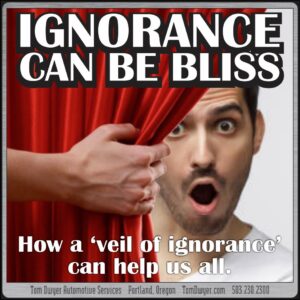Ignorance can be bliss
A Veil of Ignorance can help us all
In today’s world, we all seem to be grasping for moral or ethical absolutes that aren’t there. Maybe some things aren’t really arguable; for example we can all agree that murder is wrong. But agreement is one thing, proof is another. Can we prove it? What about things that aren’t as agreed-on as murder? If I’ll be damaged by a policy but you’ll be killed by it, can you prove we shouldn’t have the policy? Is slavery OK? Few people today think so, but centuries ago most people thought it was. Can we prove it today? Is a politician obligated to serve the People, or is that just a charmingly naive hope? Can we prove it? No, most ethical questions aren’t as cut-and-dried as murder, most need some subtlety to decide. In a world where few people agree on anything, or in today’s world where most people scream their positions at others rather than trying to convince them, how can we possibly decide what to do when a ‘provable’ solution might not exist?
This question bothered philosopher John Rawls in the late 60’s, so in 1971 he answered it with his landmark book “Theory of Justice”, and the “Veil of Ignorance”. It seemed to be a mashup of religions’ “Do unto others” dictums with some Rand Corporation Game Theory, and it gave a way to analyze societal, ethical, or political questions from a neutral position. Here’s how it works…
- The participants’ task is to make rules for a society (or create an organization, or solve a problem) in a way that would be fair to ALL involved. They are told they will eventually have to live under the rules they create.
- They start their inquiry in an imaginary ‘original position’ before laws or rules. Here’s where the Veil of Ignorance comes in… they know they’ll have to follow thee rules they make when they’re done, but they don’t know who they will be in the finished product. When they make the rules they know nothing about their gender, race, age, intelligence, wealth, skills, education, religion, or anything else… they’re just people, just players.
- Participants are assumed to have all the basic capacities needed to participate in a mutually cooperative society, and none will be refused membership in the society.
- Individuals are assumed to be able to form, pursue, and revise their concept of ‘good’, or a ‘good life’, as they see fit within their own minds. Whether or not the society eventually supports it, they can reason to their view of ‘the good’ on their own.
- Individuals are assumed to be able to form a concept of right and wrong, and have a general aptitude to abide by it.
Given these basics, the participants set rules for the task at hand. Because you don’t know who you would be in the new system, it makes no sense to disadvantage any subgroups or individuals because YOU could find yourself in one of the groups that gets the short end of the stick! In these conditions, research has shown participants tend to propose egalitarian systems out of their own rational self-interest.
“Wait!” someone says. “Why assume people want to abide by a right/wrong standard? What about the people who will upset the applecart?” Good question, because any society has to deal with violence, criminals, and threats. The Veil encourages a fair solution because the rules apply to everyone. You may be criminal or judge, victim or bystander or uninterested party, and all those roles have interests. But remember, YOU don’t know who YOU’LL be when it plays out. If you support a harsh or even tortuous justice system, you’d be very disappointed to find yourself a person of color who looks suspicious.
Another critique might be that no one is ever in an idealized “Original Position”. It’s almost always a thought experiment… almost. There are rare occasions when a group of people get together with the explicit intention of making rules for a new group. It might be happen in business setups, sports teams, social groups, or… countries. Invaders dictating terms and rebels organizing utopias both are in the Original Position, with probably very different ideas of fairness. The more they wanted to make a fair society, the more a Veil of Ignorance would help.
Just for example, let’s say there was some high-level government official accused of some crime. Some orange official, for example. Not knowing whether you’d be the official, his political opponents, prosecutors, judges, police, voters, or whatever, what would be a fair system that serves all their interests? A system that rightly protects the accused from being railroaded, along with the government’s need to enforce rules? Well, over 200 years ago some people grappled with just those questions, and tried to make a system of courts, juries, grand juries, to recognize the legitimate interests of all involved. Now, take that general system and apply it to our orange example. Is the government running a roughshod witch hunt over his freedoms, or are they checking every box, bending over backward to make sure their evidence is ironclad, and presenting their findings to multiple juries? Is the generic process, decided by folks in the “Original Position”, the process that must be fair to all, being applied evenly in our example? Well, it’s a hypothetical, let’s hope it never comes up in reality. But the Justice-is-blind reasoning behind the Veil of Ignorance would give us a fair and unbiased starting point to consider it.
When you were a kid and had to split a cookie evenly with a friend, what was the fair way to do it? One person divided the cookie, but the other person picked. The divider, not knowing which piece they’d get, had every incentive to make the split evenly. The picker was able to take the bigger piece, if there was one. Together, their interests balanced and it came out fair. The Veil of Ignorance seems like a college-level version of that, but sometimes the simplest ideas are the best.
Unsurprisingly, we can’t cover the depth of a philosophical concept in a newsletter article, but it was interesting to us and if it’s interesting to you, we have several resources to direct you to. Enjoy!
Digging Deeper
Veil-of-ignorance reasoning favors the greater good, Huang, Greene, and Bazerman on PNAS.org, Nov 2019
What Did John Rawls Mean by the Veil of Ignorance?, Monisha Choudhary on The Collector, Aug 2023
Veil of Ignorance (video), Ethics Unwrapped, McCombs School of business
Veil of Ignorance (video), BBC Radio 4
Rawls: Original Position and Veil of Ignorance Explained (video), Philophy Vibe
Thought Experiment- Veil of Ignorance (video), SRF Kultur Sternstunden
Rawl’s Theory: Justice as Fairness- Section 4. Problems with Rawl’s Theory, Philip A. Pecorino at CUNY, 2002
Using the Veil of Ignorance to align AI systems with principles of justice, Weidinger et al, National Library of Medicine, May 2023
Why should someone care about Rawls’ Veil of Ignorance? SalmonApplecream on Reddit, 2020
Hayek and Buchanan: Rawls, Egalitarianism and Social Justice, YouTube, Free to Choose Network
What are prominent attacks of Rawls’ “veil of ignorance” argument? Which liberal philosophers have advanced it?, Philosophy Stack Exchange, 2011
How to Make Fair Laws: John Rawls and the Veil of Ignorance (video), PhilosophyAndStuff, reddit
Do you apply the Veil of Ignorance in business?, Stephen Barnes on Dynamic Business, Feb 2018
A veil of ignorance can promote fairness in a mammal society, Marshall et al in Nature, Jun 2021
The Fairness Principle: How the Veil of Ignorance Helps Test Fairness, Mental Models












